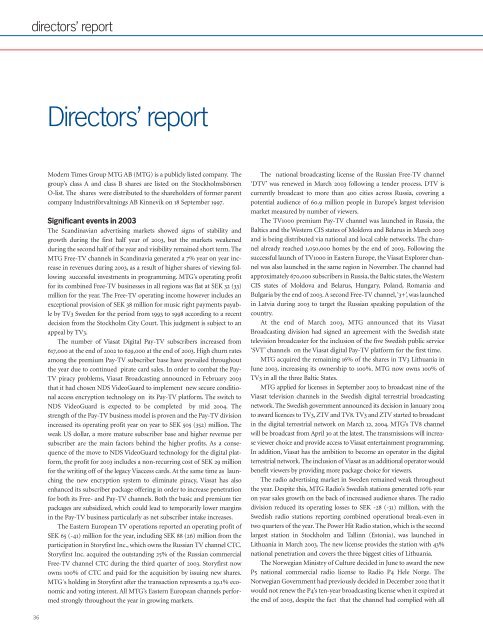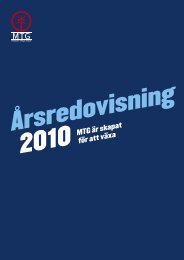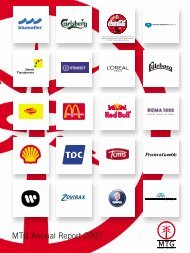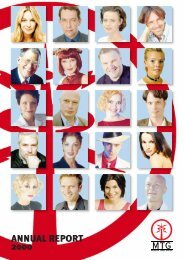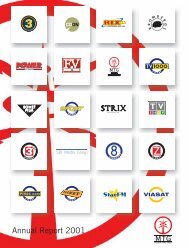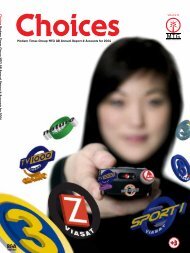Annual Report 2003 - Modern Times Group MTG AB
Annual Report 2003 - Modern Times Group MTG AB
Annual Report 2003 - Modern Times Group MTG AB
You also want an ePaper? Increase the reach of your titles
YUMPU automatically turns print PDFs into web optimized ePapers that Google loves.
directors’ report<br />
36<br />
Directors’ report<br />
<strong>Modern</strong> <strong>Times</strong> <strong>Group</strong> <strong>MTG</strong> <strong>AB</strong> (<strong>MTG</strong>) is a publicly listed company. The<br />
group’s class A and class B shares are listed on the Stockholmsbörsen<br />
O-list. The shares were distributed to the shareholders of former parent<br />
company Industriförvaltnings <strong>AB</strong> Kinnevik on 18 September 1997.<br />
Significant events in <strong>2003</strong><br />
The Scandinavian advertising markets showed signs of stability and<br />
growth during the first half year of <strong>2003</strong>, but the markets weakened<br />
during the second half of the year and visibility remained short term. The<br />
<strong>MTG</strong> Free-TV channels in Scandinavia generated a 7% year on year increase<br />
in revenues during <strong>2003</strong>, as a result of higher shares of viewing following<br />
successful investments in programming. <strong>MTG</strong>’s operating profit<br />
for its combined Free-TV businesses in all regions was flat at SEK 32 (33)<br />
million for the year. The Free-TV operating income however includes an<br />
exceptional provision of SEK 38 million for music right payments payable<br />
by TV3 Sweden for the period from 1993 to 1998 according to a recent<br />
decision from the Stockholm City Court. This judgment is subject to an<br />
appeal by TV3.<br />
The number of Viasat Digital Pay-TV subscribers increased from<br />
617,000 at the end of 2002 to 629,000 at the end of <strong>2003</strong>.High churn rates<br />
among the premium Pay-TV subscriber base have prevailed throughout<br />
the year due to continued pirate card sales. In order to combat the Pay-<br />
TV piracy problems, Viasat Broadcasting announced in February <strong>2003</strong><br />
that it had chosen NDS VideoGuard to implement new secure conditional<br />
access encryption technology on its Pay-TV platform. The switch to<br />
NDS VideoGuard is expected to be completed by mid 2004. The<br />
strength of the Pay-TV business model is proven and the Pay-TV division<br />
increased its operating profit year on year to SEK 505 (352) million. The<br />
weak US dollar, a more mature subscriber base and higher revenue per<br />
subscriber are the main factors behind the higher profits. As a consequence<br />
of the move to NDS VideoGuard technology for the digital platform,<br />
the profit for <strong>2003</strong> includes a non-recurring cost of SEK 29 million<br />
for the writing off of the legacy Viaccess cards. At the same time as launching<br />
the new encryption system to eliminate piracy, Viasat has also<br />
enhanced its subscriber package offering in order to increase penetration<br />
for both its Free- and Pay-TV channels. Both the basic and premium tier<br />
packages are subsidized, which could lead to temporarily lower margins<br />
in the Pay-TV business particularly as net subscriber intake increases.<br />
The Eastern European TV operations reported an operating profit of<br />
SEK 65 (-41) million for the year, including SEK 88 (26) million from the<br />
participation in Storyfirst Inc., which owns the Russian TV channel CTC.<br />
Storyfirst Inc. acquired the outstanding 25% of the Russian commercial<br />
Free-TV channel CTC during the third quarter of <strong>2003</strong>. Storyfirst now<br />
owns 100% of CTC and paid for the acquisition by issuing new shares.<br />
<strong>MTG</strong>´s holding in Storyfirst after the transaction represents a 29.1% economic<br />
and voting interest. All <strong>MTG</strong>’s Eastern European channels performed<br />
strongly throughout the year in growing markets.<br />
The national broadcasting license of the Russian Free-TV channel<br />
‘DTV’ was renewed in March <strong>2003</strong> following a tender process. DTV is<br />
currently broadcast to more than 400 cities across Russia, covering a<br />
potential audience of 60.9 million people in Europe’s largest television<br />
market measured by number of viewers.<br />
The TV1000 premium Pay-TV channel was launched in Russia, the<br />
Baltics and the Western CIS states of Moldova and Belarus in March <strong>2003</strong><br />
and is being distributed via national and local cable networks. The channel<br />
already reached 1,050,000 homes by the end of <strong>2003</strong>. Following the<br />
successful launch of TV1000 in Eastern Europe, the Viasat Explorer channel<br />
was also launched in the same region in November. The channel had<br />
approximately 670,000 subscribers in Russia, the Baltic states, the Western<br />
CIS states of Moldova and Belarus, Hungary, Poland, Romania and<br />
Bulgaria by the end of <strong>2003</strong>. A second Free-TV channel,‘3+’, was launched<br />
in Latvia during <strong>2003</strong> to target the Russian speaking population of the<br />
country.<br />
At the end of March <strong>2003</strong>, <strong>MTG</strong> announced that its Viasat<br />
Broadcasting division had signed an agreement with the Swedish state<br />
television broadcaster for the inclusion of the five Swedish public service<br />
‘SVT’ channels on the Viasat digital Pay-TV platform for the first time.<br />
<strong>MTG</strong> acquired the remaining 16% of the shares in TV3 Lithuania in<br />
June <strong>2003</strong>, increasing its ownership to 100%. <strong>MTG</strong> now owns 100% of<br />
TV3 in all the three Baltic States.<br />
<strong>MTG</strong> applied for licenses in September <strong>2003</strong> to broadcast nine of the<br />
Viasat television channels in the Swedish digital terrestrial broadcasting<br />
network. The Swedish government announced its decision in January 2004<br />
to award licences to TV3, ZTV and TV8.TV3 and ZTV started to broadcast<br />
in the digital terrestrial network on March 12, 2004. <strong>MTG</strong>’s TV8 channel<br />
will be broadcast from April 30 at the latest. The transmissions will increase<br />
viewer choice and provide access to Viasat entertainment programming.<br />
In addition, Viasat has the ambition to become an operator in the digital<br />
terrestrial network. The inclusion of Viasat as an additional operator would<br />
benefit viewers by providing more package choice for viewers.<br />
The radio advertising market in Sweden remained weak throughout<br />
the year. Despite this, <strong>MTG</strong> Radio’s Swedish stations generated 10% year<br />
on year sales growth on the back of increased audience shares. The radio<br />
division reduced its operating losses to SEK -28 (-31) million, with the<br />
Swedish radio stations reporting combined operational break-even in<br />
two quarters of the year. The Power Hit Radio station, which is the second<br />
largest station in Stockholm and Tallinn (Estonia), was launched in<br />
Lithuania in March <strong>2003</strong>. The new license provides the station with 43%<br />
national penetration and covers the three biggest cities of Lithuania.<br />
The Norwegian Ministry of Culture decided in June to award the new<br />
P5 national commercial radio license to Radio P4 Hele Norge. The<br />
Norwegian Government had previously decided in December 2002 that it<br />
would not renew the P4’s ten-year broadcasting license when it expired at<br />
the end of <strong>2003</strong>, despite the fact that the channel had complied with all


